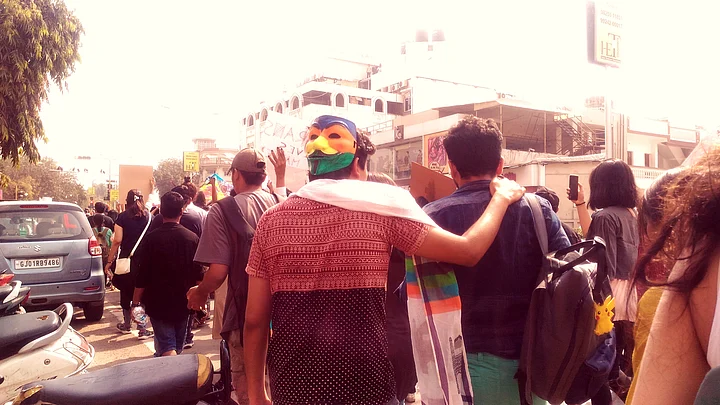The queer community of Ahmedabad came out in large numbers as the city organised its first ever queer conference, Sambandh. Led by Queerabad, a shared safe space for the city’s LGBTQIA community founded by danseuse Mallika Sarabhai’s daughter Anahita and Shamini Kothari, the three-day event ended with a very successful Pride March on Sunday.
“We had 300 people join us on the streets celebrating Pride with great slogans and spirit. If there was any doubt about whether there is a strong queer presence in Ahmedabad or Gujarat, that has been cleared now,” said Shamini Kothari, who also works with Conflictorium, a museum that works on conflict issues.
The conference was primarily in response to the lack of space to share queer studies and research. Says Shamini:
While Queerabad has been organising ‘Ask What You Will’ every last Sunday of the month since its inception in 2016, the conference was a more complex, nuanced answer to issues that are important socially and politically.
Role of Academics in the Queer Movement
At Sambandh, discussions were led by JNU professor Brinda Bose and academic-activist Akshay Khanna – while several research students elaborated upon their essays and papers on the subject.
One such paper, ‘Confronted By The Body: negotiating visibility, and occupying public space in urban India’ by Amalina K Dave and Raj Merchant stated that societal norms in India dictate that, women or persons assigned the gender female at birth (PAGFB) – whether queer or not – are restricted from accessing public spaces, unlike cismen who access these spaces with a sense of entitlement learned from childhood. It explored the policing of gender and sexuality in urban spaces that dictates what and how you can look like, behave, do or not do in a particular space.
Another paper titled ‘Queer Friendships’ by Nandita Dutta looked at how most ‘literature on male friendships display a tendency to ‘queer’ them by reading into them the ‘erotic’.’
This exercise in ‘queering’ friendships does disservice to men by trying to fit their bonds into pre-existing categories of social relations.‘Queer Friendships’ by Nandita Dutta
Consequently, Dutta suggested an alternative definition of 'queer friendship' between men, regardless of their sexual orientation, that de-centres sex and romance in favour of emotional intimacy and nurturing.
Shamini, who did her Masters in sexual dissidence, shared her paper on ‘Sakhi, a queer reading of Amrita Pritam’s works, namely her paintings ‘Bride’s Toilet’ and ‘Women resting on a charpoy’ among others.
Devesh Singh, a tech graduate who participated in all the events said that it was the first time he truly felt like he belonged to the community –
There was an adrenaline rush from being at the Pride March. The speakers at the conference were experts and there was so much to learn, even as a queer person. It is amazing that so much research is being done on this subject; people can’t just brush it off as a non-issue anymore.
The Queer Mela that was held at Sarabhai’s Darpana Academy also saw friends and family of queer people join in.
Riddhi Rathore, an undergraduate and volunteer at the event said,
I think this visibility and celebration was long due. I am sure the Pride has begun a conversation on issues of gender and sexuality. It’s a hopeful start for the city. In fact, the response was in support to the attendance in the Pride; it was massive and unexpected.
Much to do
While the city can congratulate itself on the attendance it logged for the fest, there is much to do in terms of awareness. For instance, there were only a few parents who showed up at the Pride. Those who did included Mallika Sarabhai.
Steadily, many parents will know it’s completely normal to have a queer child. We are elated that at least a few parents made it.Vicky, one of the participants at the Pride
Another point was that a lot of the bystanders couldn’t understand the reason for the march. Raghubhai Patel, owner of a kirana store at CG Road, watched the procession, heard the slogans and asked, “What is this about, the Dalits?”
While pamphlets were being given out to the curious, the cause was pretty much lost on the lower-middle class section of the society that witnessed the march.
(Runa Mukherjee Parikh is an independent journalist with several national and international media houses like The Wire, Bust and The Swaddle. She previously reported for the Times of India. She is the author of the book 'Your Truth, My Truth (https://www.amazon.in/dp/B076NXZFX8)'. You can follow her at @tweetruna.)
(The Quint, in association with BitGiving, has launched a crowdfunding campaign for an 8-month-old who was raped in Delhi on 28 January 2018. The baby girl, who we will refer to as 'Chhutki', was allegedly raped by her 28-year-old cousin when her parents were away. She has been discharged from AIIMS hospital after undergoing three surgeries, but needs more medical treatment in order to heal completely. Her parents hail from a low-income group and have stopped going to work so that they can take care of the baby. You can help cover Chhutki's medical expenses and secure her future. Every little bit counts. Click here to donate.)
